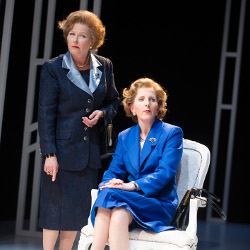Guest blog: Setting the context for Margaret Thatcher in Handbagged
At last week’s WhatsOnStage Outing to ”Handbagged”, we had a lively post-show Q&A with author Moira Buffini and director Indhu Rubasingham, including some very direct questions posed by theatregoer Leonard Klahr about how Thatcher is portrayed in the play. We invited Leonard to share more of his thoughts about Thatcher’s legacy and how it’s captured on stage

© Tristram Kenton
When Sir Alex Ferguson writes in his recently published autobiography that David Beckham could have been a great footballer, many people don't understand because the spin machines have made them believe that he was. Similarly, any suggestion that Margaret Thatcher was one of the greatest of the 20th century’s Prime Ministers is greeted with incredulity because she is too often portrayed as a one-dimensional character at odds with the world.
This, I suggest, is the flaw at the centre of Moira Buffini‘s otherwise entertaining and amusing play Handbagged (which I think, in any event, stands up very well to comparison with Peter Morgan's The Audience, which was really no more than a series of sketches).
Plays devoted to politics are always likely to be controversial, because of what they leave out as much as what they leave in. Towards the end of Buffini’s play, we hear a passionate (and in many ways moving) speech from trade unionist "Arthur Scargill". But where were the counter arguments about the background to the mining industry and the general state of industrial relations in 1980s Britain?
The play also seems to try hard to blame Mrs Thatcher’s policies for the perceived ills of the present day. Yes, we live in a less-than-perfect society (even after 13 years of a Labour Government), but the more consensual basis of British politics we have today, supported by the vast majority of the electorate, was, like it or not, started by the Thatcher "revolution".
The lack of context in Handbagged extends beyond merely what Thatcher did or did not do, be her actions seen as good or bad. There’s also scant explanation about the country that the Thatcher government inherited, the high level of strikes, the punitive taxation and Britain’s rapidly declining place in the world.
Mrs Thatcher, by the strength of her principles – and, occasionally, her personality – gradually reversed the downward trend of our international reputation. But as Enoch Powell said, "all political careers end in failure". By the end of her leadership, Mrs Thatcher had clearly grown to be out of touch with the public. Nevertheless, her legacy is surely that she changed the course of British politics – in my opinion (and, I guess, in the opinion of the electorate), for the better.
While history, I believe, will regard Margaret Thatcher as one of the great Prime Ministers of the 20th century, the audience at the Tricycle Theatre – particularly the younger members of it – are not given much of a glimpse of this.
The cast of Handbagged are uniformly good, with the double casting of the main characters (the Queen and Mrs Thatcher) very effective. The older pairing tend to look on and act as commentators on the events as they unfold over the term of the Thatcher premiership, and these more mature actresses, Marion Bailey and Stella Gonet, are particularly effective in capturing the mannerisms and voice inflections we all recognise and know well.
They are very ably supported by their younger counterparts, played by Clare Holman and Fenella Woolgar, as well as the two game male actors, Jeff Rawle and Neet Mohan, who play an assortment of roles from footmen to major characters in the unfolding story such as Dennis Thatcher, Ronald Reagan and Arthur Scargill.
Handbagged ends subtly and possibly, belatedly, sympathetically. The older Thatcher declaims, "One doesn’t die of dementia. It is not a fatal condition. One dies of something else. One lives with Dementia."












